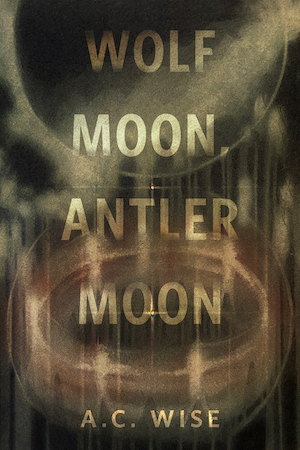An attempt to write a concise essay about The Exegesis of Philip K. Dick immediately makes me feel like I’m inside of a Philip K. Dick story, specifically an early one called “The Preserving Machine.” In it a scientist wants to figure out a way beautiful works of classical music could survive in a post-apocalyptic world. Eventually, this is accomplished by the invention of a Preserving Machine, which converts these pieces of music into formidable biological creatures, which can survive any terrain. But these critters are nasty buggers and don’t resemble the beautiful pieces of music from which they came. Running them back through the Preserving Machine doesn’t work either!
So how can I turn a 900+ page volume from Dick into a little blog creature, which can survive the ravages of the internet without losing something? Especially when the nature of the writings in this book messes with the fabric of, well, pretty much everything?
The Exegesis of Philip K. Dick is, in essence, an exploration on the part of an author to understand reality and conceive of new ways of framing the conversation about it. In many ways, this work strikes me as a sort of mash-up of Kant and Foucault sensibilities. On the one hand, Dick wants to establish an ontological framework in which to talk about these issues, while at the same time he has an impulse to constantly tear down any assumptions about reality, frequently using the existence of his science fiction as proof. The introduction from co-editors Jonathan Lethem and Pamela Jackson informs the reader that what they are about to embark upon might not make sense, at least not in the conventional way we think about that word, and they have a simple explanation as to why:
The majority of these writings, that is to say, are neither familiar nor wholly lucid nor, largely, elegant—nor were they intended, for the most part, for publication.
There you have it. Dick’s Exegesis then is a treatise on life, and a documentation of the exploration of one’s life that was not intended for publication. Does this make a lot of the text diaristic? Certainly. But imagine if Nostradamus or Socrates had tape recorded themselves, and then transcribed those tape recordings, put them in several folders, and then also threw in a series of letters to their various friends and acquaintances. And on top of all that, they also tried to also make commentary on how it all related to each other and their own work, which was separate from the recordings. That’s what kind of diary this is. There’s a lot of media, which is pervading the text of the Exegesis, even though much of it is not physically present.
And one medium that is not “physically” present, but somewhat “real” for Dick is that of spirits, or possessions. When he writes about this stuff, is it the rantings of a madman? Check out this excerpt from a letter her wrote to Ursula Le Guin in 1974:
Tom Disch came back a couple of weeks ago and I told him about it. [a possession] He suggested perhaps it was Elijah who had possessed me, and so I read up on Elijah; that explanation fits as well as any other, and so I ran with that until last night when, in falling asleep, I thought the words “poros” and “krater,” and then looked them up today and sure enough once more, they are Greek words, and words which I certainly didn’t know.
Is Dick sane throughout this stuff? Is it reasonable to assume that not knowing Greek words which you have spoken aloud proves that a possession took place? Well, it all depends on what your definition of the word “is” is. And the word “reasonable,” too! However, the majority of the Exegesis itself is predicated upon an experience Dick had which he refers to as “2-3-74” and in someplace just as “3-74.” In a nutshell, the experience was a kind of metaphysical epiphany. An epiphany about what? Well, that’s what the Exegesis is attempting to explain. In a great section towards the middle of the book (pg. 371) Dick actually looks inward for more terrestrial explanations as to his various visitations and possessions:
And now I exhaust myself trying to explain 3-74. I was lithium toxic. And had a schizophrenic breakdown.
The footnote on this page from editor David Gill is quick to point out that this statement from Dick is a kind of indication that Dick was not insane, as totally insane people don’t generally question their own sanity. Instead, Dick was truly trying to be honest with himself about what was happening. Clearly SOMETHING was happening, and whether it was all in his head was a possibility he was willing to entertain. But the important assertion, (like the Dumbledore quote from the final Harry Potter book!) is that just because it might have been happening in his head, didn’t make it any less real.
The Exegesisof Philip K. Dick is more of a philosophical text than it is mediation on the nature of science fiction. But the nice thing is that Dick clearly didn’t really view science fiction as fiction at all. In fact, you could go so far as to say that Philip K. Dick, at some point in his life, refused to actually understand the differences between art, personal interactions, reality, conciseness, and unconciseness. If forced to over-simplify his ideas via his own Preserving Machine, I would characterize The Exegesis of Philip K. Dick as follows: if thoughts created the universe instead of physical objects, this is the entire universe wrapped up in a triple decker sandwich which has infinite length. The sandwich also may or may not be conceptual.
But, if you like Philip K. Dick, and you like thinking outside of every box ever known, then this book will not only be satisfying, but also make you hungry to go back and read all of Dick’s novels and short fiction. In fact, I feel like it’s time to go read “Faith of our Fathers” right now.
Ryan Britt is the staff writer for Tor.com. He worked at Barnes & Noble as a teenager back when you still had to wear a tie.











So, what did we learn today?
The humans are not alone in fitting blinkenlights to their covert ops communicators. Another few centuries of R&D, and they’ll cut it down to perky chirps. And the shuttles are armed. Is that new?
I’m not sure how I think about the Vulcan approach to planetary sovereignty. How they deal with their dissidents is up to them, it seems, as long as they take their Vulcan advice meekly. And how did the Vulcans ever keep their reputation that they don’t lie?
Was the getting-out-of-the-ropes sequence supposed to be eye candy? If they had spent less time speaking and more time working the knots, they might have gotten out in time … to get killed, maybe.
@1: “Hey, Vulcans, do you lie?”
“No.”
“Is that a lie?”
“Since we do not lie, logic dictates that it must not be.”
“Huh… checks out. Hey everyone, Vulcans never lie!”
I found this episode rather unfocused. It’s got some cute business with Shran wanting to repay his debt so he can get some sleep — it establishes that he has integrity, but in a way that maintains his irascibility and unfriendlines. But unfortunately, the part that stands out most in my memory is the sophomoric bondage sequence. This show’s producers had a terrible approach to sex appeal, contriving to put the female leads in accidentally revealing or (supposedly) titillating situations, which took away their agency and consent and was thus rather prurient. There’s a lot about TOS we justifiably see as sexist, but at least the female characters there were usually trying to be sexy and seductive, so they had more agency than T’Pol getting Archer’s face mushed against her chest or Hoshi in the season finale losing her top when she drops out of a vent.
It occurs to me I haven’t mentioned how miscast I felt Gary Graham was as Soval, at least initially. I first got to know Graham as the lead of the Alien Nation TV series from 1989-97 (counting the revival movies), and he did a great job there playing a very emotional character, a constantly angry guy who had a sensitive soul and wore his heart on his sleeve. But I felt for most of ENT’s run that he did a poor job dialing back his emotional intensity enough to be convincing as a Vulcan. It wasn’t until season 4 that I felt he finally got a handle on Vulcan acting, and after that he was quite good at it.
Although as the series went on, a lot of other actors would have similar issues, playing Vulcan characters with far too much emotionality — Robert Foxworth as Administrator V’Las in season 4 in particular. But by then, it kind of worked in the stories’ favor, since it was established that the Vulcans had lost touch with Surak’s true teachings.
I first saw Gary Graham in the legendary, thoughtful, nuanced, artistic triumph known as… Robot Jox. He was pretty emotional there, too.
@4/Delos: Oh yeah, Robot Jox. Not a bad film, actually, for what it was. It had a pretty smart script by noted SF novelist Joe Haldeman, though it got somewhat dumbed down in rewrites.
Yup, Robot Jox is fun, in sort of that boffo social commentary school of sci-fi flick. Paul Verhoeven must’ve been a fan, I would imagine.
I believe it’s free to watch on Tubi or one of those other streamers right now.
I’m not going to lie, that bit with Captain Archer & T’Pol almost managing to wriggle their way out of their restraints struck me as a first-rate bit of physical comedy … right up until they made a boob of the ending (Although seeing those terrorists rush in right after Our Heroes got loose gave me the strong impression that those guards had been watching the entire time, quite possibly taking bets and maybe a bit TOO distracted by their surprise at these two ‘guests’ actually making a go of their escape).
Also, it’s absolutely delightful to see T’Pol get her due after being absolutely indispensable for so many episodes (Possibly even better than seeing Shran back in town, though it’s a close-run thing either way); it’s also amusing to see that Doctor Phlox’s tendency to pilfer from the plates of others alive & well (I’m beginning to suspect that the Denobulan sense of personal space extends no further than the outer limits of their skin!).
One interesting question this episode presents us is “What might have become of NX-01 with Captain Gardner in charge?” (While Ambassador Soval’s support for the man suggests somebody perhaps a little too in awe of the Vulcans, I doubt the Good Captain was anything but an exemplary professional – something Captain Archer occasionally struggles to be).
@3. ChristopherLBennett: In all honesty the fact that Vulcans are not actually emotionless (except for those who’ve pursued Logic all the way to Kolinahr) strikes me as adequate justification for some Vulcans being at least a little emotive – especially by comparison with Mr Spock, who (let us remember) has always had more to prove than most when it comes to walking the Way of Surak and was for much of his more life more a ‘Model Vulcan’ than a completely representative one (Very much in the same way Mr Worf was a ‘Model Klingon’).
To be honest I think the ideal Vulcan performance is controlled, not genuinely passionless (A balance that Ms. Blalock has proven herself to be rather good at striking thus far in the rewatch; in all honesty that’s something I missed on my first encounters with ENTERPRISE, during it’s initial run), although I do agree that sort of feeling is better kept simmering beneath the surface than bubbling up around the edges.
“And T’Pol falling boobs-first on Archer was just cringe-inducing.”
So very cringe. Bakula talking to John Stewart about it is also cringe:
https://www.cc.com/video/09l92h/the-daily-show-with-jon-stewart-scott-bakula
At the time I didn’t care much for T’Pol, but rewatching the series I can only commend Blalock for doing as well as she did with such limited material.
@7/ED: Of course Vulcans aren’t emotionless, but my point is that there’s a right and a wrong way for an actor to emote as a Vulcan. The right way is the way Nimoy did it, by internalizing the emotion and expressing it subtly beneath a surface of control and discipline. Tim Russ and Jolene Blalock did it fairly well also. When they wanted to convey irritation, for instance, they did it with a subtle tension to the voice, a slight narrowing of the eyes or lips. Compared to that, Soval’s shows of irritation in seasons 1-2 were practically J. Jonah Jameson tantrums.
@5 – “”it’s as if I’d had a child who started out well and then sustained brain damage.”” Joe Haldeman on Robot Jox.
And yet, seven years later and with a whole new production crew, they still had Kirk grabbing Uhura’s breasts and grinning at her during the bar fight. Instead of her silly pushing him off of her, she should have been the one to deck him and knock him out cold.
It seems that Star Trek never learns.
Watching this makes me wonder how the galaxy wasn’t in a state of perpetual war until Archer and the rest of the humans showed up. Nobody seems to get along with anyone else without at least the suggestion of force. It would have been interesting to see what happens when Starfleet screwed up but good. How would humanity react? How would the crew? The Vulcans? But. our intrepid crew are the ones in the credits so they always have to come out on the right side of things, even though mistakes happen in the real world.
Let’s see Archer doing what he things is the right thing and pushing an alien race to do something that turns out horribly wrong because he didn’t fully understand the situation or the races invited and how they would react. Show us something going so badly that it brings in the Prime Directive.
Instead, we get these guys versus those guys versus those other guys with Archer in the middle working it all out 5 minutes before the end of the episode so we have time for the tag.
Yes, this is a follow up to a prior episode but the destruction of the monastery plays a surprisingly small part. Mostly, it’s played to give Shran a chance to get out of Archer’s debt. And speaking of Shran, has he been following the Enterprise, just waiting for such a chance? If not, then space, which should be very, very big is shown as very, very small.